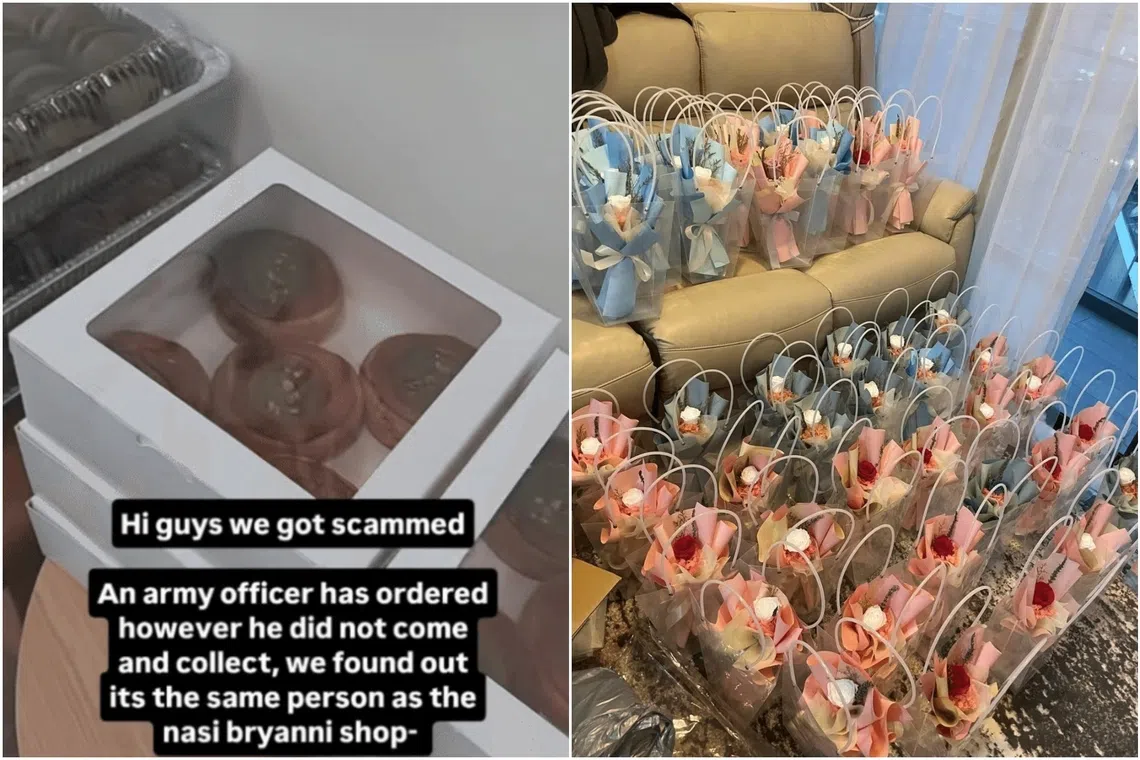Woman charged over alleged links to fake SAF bulk order scams
Sign up now: Get ST's newsletters delivered to your inbox

Rajadi Rajasinghe Manamendra Patabadilage Vishwa Madavi, 22, is the first of three people to be charged in the case.
PHOTOS: BREADITATION BAKERY SG/INSTAGRAM, COURTESY OF KIKI FLORIST
SINGAPORE - A Sri Lankan woman was charged on Sept 17 over her alleged links to a recent spate of fake bulk order scams
Rajadi Rajasinghe Manamendra Patabadilage Vishwa Madavi, 22, who is now remanded at Central Police Division, was handed a charge under the Computer Misuse Act and is accused of relinquishing her bank account to others.
Rajadi, who is on a student pass, is also said to have facilitated unauthorised access to a computer system, and allegedly disclosed her bank login password to an unknown person in September.
Her bank account allegedly received a large amount of funds, the court heard on Sept 17.
She is expected to plead guilty on Oct 1.
If convicted of misusing a computer system, a first-time offender can be jailed for up to two years and fined up to $5,000.
A repeat offender can be jailed for up to three years and fined up to $10,000.
In a statement on Sept 16, the police said officers arrested three people over their suspected involvement in fake bulk order scams involving the impersonation of personnel from the Singapore Armed Forces (SAF).
Rajadi is the first of the trio to be charged in the case.
A police spokesperson said that since Sept 4, there have been at least five reported cases, involving at least $32,000 in losses.
The trio were caught following raids around Middle Road, Woodlands Street 81 and Cantonment Road on Sept 15 and 16.
Officers also seized several electronic devices and pre-paid cards during the two-day operation.
Preliminary investigations revealed the trio had allegedly acted on the instructions of a scam syndicate.
One of the three suspects allegedly helped unknown individuals subscribe to phone lines, with some of these linked to such scam cases.
In a Facebook post on Sept 14, the Ministry of Defence warned the public
It said it was aware of seven such cases, none of which involved SAF personnel, and that police reports had been lodged.
In another statement, the police also warned that scammers may pose as staff from local schools and pretend to make reservations or place bulk orders.
The scammers would also request additional items, or specific brands the targeted businesses do not carry, or quantities the businesses are unable to fulfil on short notice.
Multiple eateries have fallen prey to such scams

Mr Chee Hang Joon, the boss of Sedap! eatery in Novena, told The Straits Times on Sept 15 that a “Luke Wong”, who claimed to be from the Bedok army camp, had called him on Sept 8.
“Wong” ordered 150 packets of nasi lemak with 150 bottles of water, to be delivered for lunch the next day. The food and drinks were worth about $1,600 after a discount, Mr Chee said.
“Wong” failed to show up at lunchtime on Sept 9 and became uncontactable.
Mr Chee lodged a police report at about 1.30pm that day. Fortunately, he was able to sell all the uncollected food.
In a statement in July, the police said that in fake bulk order scams, offenders would request either additional items, specific brands of goods that the victims do not carry, or order quantities that the businesses are unable to fulfil on short notice.
The scammers would then recommend an accomplice pretending to be a supplier to the victims.
The police said: “The ‘customer’ may provide fake payment documentation, such as screenshots, to convince the victims that they had made partial payment of the bulk order in advance.
“This tactic is used to persuade the victims to provide payment for the orders placed with the ‘supplier’.”
Victims would realise they have been scammed only when they do not receive any payment from the “customer”, when the “supplier” fails to deliver the goods, or when both the “customer” and the “supplier” become uncontactable.



